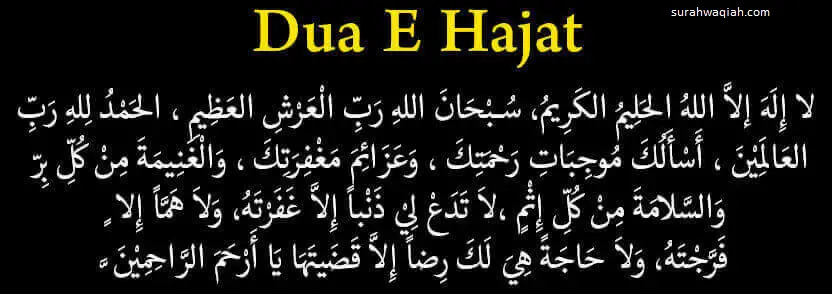Salatul Hajat Dua
Salatul Hajat Dua: A Powerful Supplication for Seeking Allah's Blessings


Introduction
Salatul Hajat, also known as the Prayer of Need or the Prayer of Desires, is a significant supplication in Islam that holds a profound importance in a Muslim’s life. This special prayer is performed to seek Allah’s guidance, mercy, and fulfillment of one’s needs and desires. It is a beautiful expression of reliance on Allah and a means to find spiritual solace during times of hardship, uncertainty, or when one is striving to achieve a specific goal. In this article, we delve into the significance, procedure, and the spiritual impact of Salatul Hajat in the lives of Muslims.
Understanding Salatul Hajat
Salatul Hajat is not one of the obligatory prayers in Islam but rather a voluntary prayer that can be performed at any time of the day or night. It is an essential aspect of a believer’s relationship with Allah, emphasizing the need for sincere supplication and complete trust in the Almighty’s wisdom and benevolence. The name “Hajat” itself translates to “need” or “desire,” and this prayer allows Muslims to express their deepest yearnings and requests before their Creator.
The Purpose and Significance
Muslims are encouraged to offer Salatul Hajat whenever they face difficulties, challenges, or feel the need for divine intervention in their lives. This prayer serves as a reminder that Allah is the ultimate source of guidance and provision, and seeking His help in times of need reinforces a believer’s faith and devotion.
The procedure of Salatul Hajat is simple and can be performed individually or collectively. It involves offering two Rak’ahs (units) of voluntary prayer, followed by heartfelt supplications. During these prayers, Muslims seek Allah’s forgiveness, guidance, and blessings, and earnestly present their desires, dreams, and wishes before Him.
The Power of Supplication
The concept of supplication (dua) holds great significance in Islam. It is believed to be a direct means of communication between a worshipper and their Creator. The act of seeking Allah’s help and presenting one’s desires through dua demonstrates humility and complete reliance on Him. The Quran and the sayings of the Prophet Muhammad (peace be upon him) contain numerous verses and hadiths that emphasize the power of dua and the benefits of turning to Allah in prayer.
The Prophet Muhammad (peace be upon him) said: “Nothing can change the Divine decree except supplication, and nothing can increase one’s lifespan except good deeds.” (Sahih Al-Jami)
Salatul Hajat as a Source of Solace
In moments of distress and uncertainty, offering Salatul Hajat can provide a sense of solace and peace to a Muslim’s heart. The act of performing this prayer allows believers to unburden their worries and fears, trusting that Allah is the best listener and the Most Merciful. In moments of confusion, Salatul Hajat serves as a means of finding clarity and direction in life, as Muslims place their faith in Allah’s divine plan.
A Means of Strengthening Faith
Salatul Hajat not only serves as a means of fulfilling needs and desires but also plays a vital role in strengthening a believer’s faith. The act of engaging in this prayer reflects a deep-seated belief in Allah’s presence and a recognition of His infinite knowledge and power. As Muslims consistently seek Allah’s guidance through Salatul Hajat, their faith is nurtured and fortified, leading to a deeper connection with the Divine.
Collective Prayers and Community Bonding
Salatul Hajat is not only performed individually but can also be offered collectively. When a group of people gathers to pray for a common cause or purpose, it fosters a sense of community bonding and solidarity. The collective dua becomes an expression of unity and empathy, as believers come together to seek Allah’s help and blessings for a shared objective.
Conclusion
Salatul Hajat is a blessed prayer that holds a special place in the hearts of Muslims. It serves as a potent means of seeking Allah’s guidance, mercy, and fulfillment of desires. Through sincere supplication and complete reliance on the Almighty, Muslims find solace, strengthen their faith, and establish a deep connection with their Creator. The beauty of Salatul Hajat lies in its simplicity and its potential to bring about positive change in the lives of those who wholeheartedly turn to Allah in prayer. As Muslims continue to offer this prayer with faith and humility, they are reminded that Allah is the ultimate source of comfort, hope, and fulfillment
What is Salatul Hajat Dua?
Salatul Hajat Dua, also known as the Prayer of Need or the Prayer of Desires, is a voluntary prayer in Islam that Muslims perform to seek Allah’s guidance, blessings, and fulfillment of their needs and desires.
Is Salatul Hajat Dua an obligatory prayer?
No, Salatul Hajat Dua is not one of the obligatory prayers in Islam. It is a voluntary prayer that can be performed at any time.
When should I perform Salatul Hajat Du
Salatul Hajat Dua can be performed at any time when you feel the need for divine intervention, guidance, or when you have specific desires or goals you wish to achieve.
How many Rak’ahs (units) are there in Salatul Hajat Dua?
Salatul Hajat Dua consists of two Rak’ahs (units) of voluntary prayer.
Can Salatul Hajat Dua be performed collectively?
Yes, Salatul Hajat Dua can be performed both individually and collectively. Muslims may gather with others to pray for a common cause or objective.
What should I recite during Salatul Hajat Dua?
During the two Rak’ahs of Salatul Hajat Dua, you can recite any verses from the Quran or supplications (duas) that you feel are appropriate for your needs and desires.
What is the significance of Salatul Hajat Dua?
alatul Hajat Dua holds great significance in Islam as it reinforces a believer’s reliance on Allah and strengthens their faith. It allows Muslims to seek Allah’s help during challenging times and express their deepest desires before Him.
Can I make different supplications in each Rak’ah?
Yes, you can make different supplications in each Rak’ah of Salatul Hajat Dua. You may present various requests, seek guidance, and express gratitude to Allah in each unit of prayer.
Is there a specific time or day recommended for Salatul Hajat Dua?
Salatul Hajat Dua can be performed at any time of the day or night. There is no specific time or day recommended for its performance.
s there any specific etiquette to follow while performing Salatul Hajat Dua?
While there is no specific etiquette exclusive to Salatul Hajat Dua, it is essential to maintain sincerity, humility, and focus during the prayer. Being in a state of ritual purity (Wudu) is recommended but not mandatory for this voluntary prayer.
Can I repeat Salatul Hajat Dua for the same need?
Yes, you can repeat Salatul Hajat Dua for the same need or desire if you feel the need to do so. Muslims are encouraged to persevere in their supplications and trust in Allah’s timing and wisdom.





